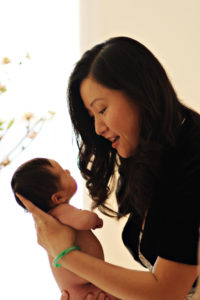The Birth of the Marination Method
Ever since we’re little girls, we dream of the love, joy, and peace a baby will bring our lives. We imagine cuddles, breathtaking firsts, and a unified family prepared to support this new life we’ve brought into the world.
But unfortunately, for many women in the United States, the reality of postpartum is far from our dreams. For one, almost 80% of women report getting the “baby blues,” or depressive symptoms after giving birth, while 20% are diagnosed with clinical postpartum depression. Left untreated, symptoms of postpartum can last for months or even years after the baby is born. Poor sleep, nutrition, and a lack of communication between a mother and partner can exacerbate these symptoms.
Many partnerships worsen after the baby is born, too. Though one might think the beginning of a family would automatically bring joy and cheer to new couples, the changes in sleep, finances, intimacy, and communication can make it so that couples get into misunderstandings they cannot solve. In fact, 50% of partnerships in the United States are seriously affected after having a new baby. And while divorce rates were slowing in the US as of 2016, it still stands that 40-70% experience serious stress and marital dissatisfaction immediately after having a baby.
Why does this happen? Is it because in the United States we’ve forgotten how to be good moms?
At Cinch Tummy Wrap™, we think it’s quite the opposite. In fact, maybe American mothers are so caught up in unrealistic versions of motherhood, that we think we can be the best employee in the office, run the PTA, be ideal wives, and get back to our pre-baby bodies almost immediately after pregnancy, and with no rest! In the US, many women are expected to go back to work after just two weeks, still sore, mentally exhausted, and not fully recovered from pregnancy. Yet, in other cultures around the world, the mom is prioritized just as much as the baby after birth, resting alongside her child for as long as 42 days with the supportive help of family to guide her. If it took us 9 months to create a new life, isn’t it reasonable to assume it would take at least a few weeks for our bodies and minds to return to normal?
How Charlene Williams Arrived at the Marination Method
Charlene Williams, founder of the Cinch Tummy Wrap™, leads a life many mothers think is impossible. She works seven days a week, all with her husband William, running three different businesses without a single day off. Together, they have three children in high school and middle school, all of which are top of their class, run several student clubs, and are successful athletes. And, remarkably, the whole family is this productive with a smile on their faces, regularly volunteering and spending quality time together, and Charlene and her husband going out for date nights every single weekend.
Believe it or not, Charlene says she’s not exhausted by her lifestyle — in fact, she believes motherhood has made her a more productive, successful, and fulfilled woman. She feels she is able to accomplish tasks she wasn’t able to before, with more focus and joy than she had ever imagined.

Charlene Williams with her daughter one month after giving birth. It is with this pregnancy that Charlene perfected the Marination Method™.
This is because Charlene followed what she now has adapted into the modern “Marination Method.” Williams’ mom is a OB/GYN, who has studied Eastern and Western medicine for over 30 years. She was educated at The Shanghai University School of Medicine, comparable to Harvard School of Medicine in the US. She insisted that Charlene rest after giving birth under her close care, following the Chinese practice of “sitting the month” postpartum. The tradition follows the belief that if mothers rest for the first 30 to 42 days postpartum, they can cure all illness and disease present before the pregnancy.
Though Charlene rested more than the average American mom for all three of her pregnancies, on her third she took rest the most seriously, knowing that the first two recovery periods hadn’t gone as planned. She had been visibly puffy and didn’t feel well after her first two pregnancies, and had trouble breastfeeding and getting her oldest son to sleep. But on her third pregnancy, she slept, ate only healthy foods, kept herself warm, made a point to laugh out loud, and didn’t leave the house for a full five weeks. Afterwards, she found herself looking and feeling better than she ever had before.
The Marination Method
Marination: to spoil, nourish, pamper, treat, and love a postpartum mother like a newborn.
One tradition stayed consistent throughout all three pregnancies: belly wrapping. Wrapping the stomach is a part of traditional Chinese postpartum care (as it is in parts of Eastern Europe as well), and it helps reduce swelling in the midsection while holding organs, muscles, and bones in place while the pregnancy hormones that made your body stretch still linger after giving birth. After her third pregnancy wrapping her stomach with an sheet, Charlene knew she had to find a way to get a belly-cinching product into the hands of American mothers. She knew modern moms needed something they could move in long after this period of rest (belly wrapping should be done for about six months), that was comfortable, and that didn’t require them to buy multiple sizes. This is how Williams created the patented design for the Cinch Tummy Wrap™.
But the Cinch Tummy Wrap™ is only one part of Williams’ greater vision. Rather, Charlene Williams has designed an entire postpartum lifestyle plan called the Marination Method, which draws on traditional Chinese teachings while combining it with the needs of the active modern mom. At its core, the Marination Method is based on a belief also held in Chinese medicine: that the mother’s body is more suited to absorbing nutrients, rest, love and care postpartum than any other time — and that taking advantage of this crucial window for health results in a happier and more fulfilled mother and family.
Recommendations include avoiding anything cold, eating high amounts of ginger and spicy foods to keep the mother’s internal temperature warm, and daily massages to help her circulation and muscle recovery. It sounds like a mother’s paradise — and it’s supposed to be!
Studies like an 1985 article by Voigt et al. show that bones damaged by trauma like childbirth recover particularly quickly, as the body goes through a period of accelerated activity in the affected areas. This process was named the “regional acceleratory phenomenon” or RAP by Frost in 1986, and a similar study discovering the same thing happens with metabolic processes was titled SAP, or the “systemic acceleratory phenomenon.” Williams believes a similar thing happens during pregnancy, where the body sends all of its excess resources to areas of the midsection that need to recover most quickly — and belly wrapping, along with rest, a healthy diet, and a lack of stress helps the body heal itself more quickly. She calls it the WRAP theory, standing for “Women Renew Acceleratory Phenomenon.”
In essence, a pregnant mother in marination should be like a caterpillar in its cocoon, arising from this five-week period a butterfly more beautiful and competent than she ever was before. And after three successful pregnancies, Charlene believes this philosophy can help thousands of other moms across the US have a happier, healthier, and more fulfilling postpartum experience and life as mothers. So, are you ready to try?
*Disclaimer: The Marination Method™ is based on Charlene Williams’ own personal experience. As with any medical advice, you should contact your doctor to determine if the Marination Method™ is right for you.







